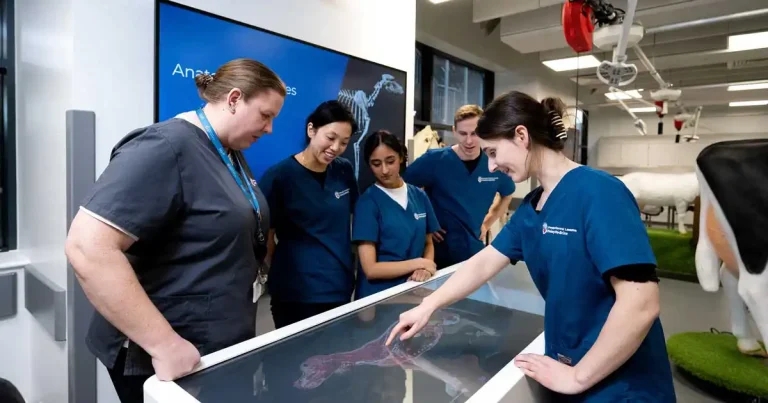24 Jun 2025
Celebrations have taken place in Preston where the new facility was formally unveiled nearly two years after building work began.

Anatomage tables are among the technology in use in the new campus.
A newly opened vet school can help to make veterinary education “accessible to all”, university bosses have claimed.
Nearly two years after welcoming its first veterinary degree students, the new, £40 million facility at the University of Central Lancashire’s (UCLan) Preston campus was formally unveiled yesterday (23 June).
Vice-chancellor Graham Baldwin said the school could now start “making a real difference to help such an important profession”.
Prof Baldwin added: “This is another very special moment in our story and the start of an exciting new chapter.”
The opening ceremony took place only days after a report by pharmaceutical giant Zoetis called for urgent measures to address ongoing workforce challenges, including widening entry paths into the sector.
UCLan officials believe they are better placed to address that challenge because of its position among England’s top 20 universities in the 2024 LSBU Social Mobility Index and an admissions policy that takes account of issues including candidates’ background and exposure to social deprivation.
The institution also acknowledged a significantly lower proportion of non-white workers in the veterinary sector than among the wider population. Other issues considered within the admissions policy include whether candidates have refugee status.
Prof Baldwin said: “It’s well known that if people can see representation of themselves within a profession, they’ll be inspired to follow a similar pathway. We want to break down barriers and make education accessible to all.”
The school’s dean, Heather Bacon, added: “We believe the work of veterinary professionals is important in all communities, and veterinary surgeons are better able to work with people when they truly understand the challenges faced by them.
“Recruiting and supporting a diversity of veterinary students is important to ensuring success of the role of the vet in a wide range of workplaces, providing a contextualised spectrum of care to veterinary patients and clients, and hopefully addressing some of the retention challenges the profession faces.”
The new school building offers a range of facilities including what is thought to be the first immersive room – which is equipped with interactive walls and smells – at a UK vet school and possibly only the second globally.